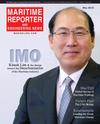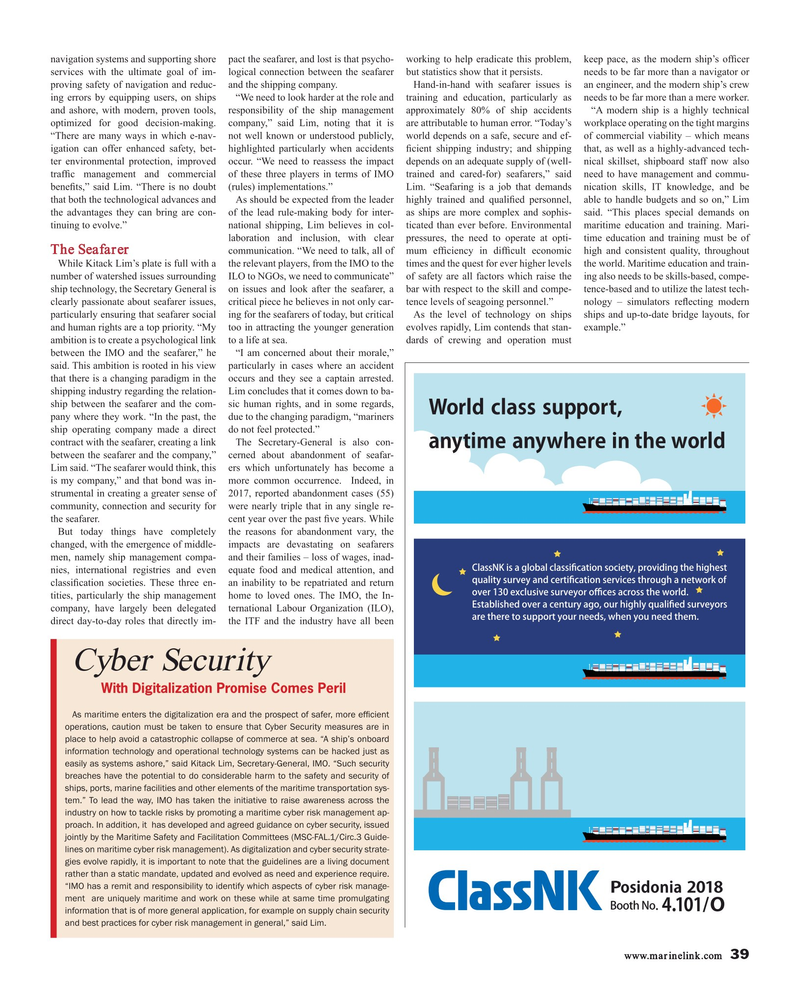
Page 39: of Maritime Reporter Magazine (May 2018)
Marine Propulsion Edition
Read this page in Pdf, Flash or Html5 edition of May 2018 Maritime Reporter Magazine
navigation systems and supporting shore pact the seafarer, and lost is that psycho- working to help eradicate this problem, keep pace, as the modern ship’s of? cer services with the ultimate goal of im- logical connection between the seafarer but statistics show that it persists. needs to be far more than a navigator or proving safety of navigation and reduc- and the shipping company. Hand-in-hand with seafarer issues is an engineer, and the modern ship’s crew ing errors by equipping users, on ships “We need to look harder at the role and training and education, particularly as needs to be far more than a mere worker. and ashore, with modern, proven tools, responsibility of the ship management approximately 80% of ship accidents “A modern ship is a highly technical optimized for good decision-making. company,” said Lim, noting that it is are attributable to human error. “Today’s workplace operating on the tight margins “There are many ways in which e-nav- not well known or understood publicly, world depends on a safe, secure and ef- of commercial viability – which means igation can offer enhanced safety, bet- highlighted particularly when accidents ? cient shipping industry; and shipping that, as well as a highly-advanced tech- ter environmental protection, improved occur. “We need to reassess the impact depends on an adequate supply of (well- nical skillset, shipboard staff now also traf? c management and commercial of these three players in terms of IMO trained and cared-for) seafarers,” said need to have management and commu- bene? ts,” said Lim. “There is no doubt (rules) implementations.” Lim. “Seafaring is a job that demands nication skills, IT knowledge, and be that both the technological advances and As should be expected from the leader highly trained and quali? ed personnel, able to handle budgets and so on,” Lim the advantages they can bring are con- of the lead rule-making body for inter- as ships are more complex and sophis- said. “This places special demands on tinuing to evolve.” national shipping, Lim believes in col- ticated than ever before. Environmental maritime education and training. Mari- laboration and inclusion, with clear pressures, the need to operate at opti- time education and training must be of
The Seafarer communication. “We need to talk, all of mum ef? ciency in dif? cult economic high and consistent quality, throughout
While Kitack Lim’s plate is full with a the relevant players, from the IMO to the times and the quest for ever higher levels the world. Maritime education and train- number of watershed issues surrounding ILO to NGOs, we need to communicate” of safety are all factors which raise the ing also needs to be skills-based, compe- ship technology, the Secretary General is on issues and look after the seafarer, a bar with respect to the skill and compe- tence-based and to utilize the latest tech- clearly passionate about seafarer issues, critical piece he believes in not only car- tence levels of seagoing personnel.” nology – simulators re? ecting modern particularly ensuring that seafarer social ing for the seafarers of today, but critical As the level of technology on ships ships and up-to-date bridge layouts, for and human rights are a top priority. “My too in attracting the younger generation evolves rapidly, Lim contends that stan- example.” ambition is to create a psychological link to a life at sea. dards of crewing and operation must between the IMO and the seafarer,” he “I am concerned about their morale,” said. This ambition is rooted in his view particularly in cases where an accident that there is a changing paradigm in the occurs and they see a captain arrested. shipping industry regarding the relation- Lim concludes that it comes down to ba- ship between the seafarer and the com- sic human rights, and in some regards, 8PSMEDMBTTTVQQPSU pany where they work. “In the past, the due to the changing paradigm, “mariners ship operating company made a direct do not feel protected.” contract with the seafarer, creating a link The Secretary-General is also con-
BOZUJNFBOZXIFSFJOUIFXPSME between the seafarer and the company,” cerned about abandonment of seafar-
Lim said. “The seafarer would think, this ers which unfortunately has become a is my company,” and that bond was in- more common occurrence. Indeed, in strumental in creating a greater sense of 2017, reported abandonment cases (55) community, connection and security for were nearly triple that in any single re- the seafarer. cent year over the past ? ve years. While
But today things have completely the reasons for abandonment vary, the changed, with the emergence of middle- impacts are devastating on seafarers men, namely ship management compa- and their families – loss of wages, inad- $MBTT/,JTBHMPCBMDMBTTJpDBUJPOTPDJFUZ
QSPWJEJOHUIFIJHIFTU nies, international registries and even equate food and medical attention, and
RVBMJUZTVSWFZBOEDFSUJpDBUJPOTFSWJDFTUISPVHIBOFUXPSLPG classi? cation societies. These three en- an inability to be repatriated and return
PWFSFYDMVTJWFTVSWFZPSP?DFTBDSPTTUIFXPSME tities, particularly the ship management home to loved ones. The IMO, the In- &TUBCMJTIFEPWFSBDFOUVSZBHP
PVSIJHIMZRVBMJpFETVSWFZPST company, have largely been delegated ternational Labour Organization (ILO),
BSFUIFSFUPTVQQPSUZPVSOFFET
XIFOZPVOFFEUIFN direct day-to-day roles that directly im- the ITF and the industry have all been
Cyber Security With Digitalization Promise Comes Peril
As maritime enters the digitalization era and the prospect of safer, more ef? cient operations, caution must be taken to ensure that Cyber Security measures are in place to help avoid a catastrophic collapse of commerce at sea. “A ship’s onboard information technology and operational technology systems can be hacked just as easily as systems ashore,” said Kitack Lim, Secretary-General, IMO. “Such security breaches have the potential to do considerable harm to the safety and security of ships, ports, marine facilities and other elements of the maritime transportation sys- tem.” To lead the way, IMO has taken the initiative to raise awareness across the industry on how to tackle risks by promoting a maritime cyber risk management ap- proach. In addition, it has developed and agreed guidance on cyber security, issued jointly by the Maritime Safety and Facilitation Committees (MSC-FAL.1/Circ.3 Guide- lines on maritime cyber risk management). As digitalization and cyber security strate- gies evolve rapidly, it is important to note that the guidelines are a living document rather than a static mandate, updated and evolved as need and experience require. “IMO has a remit and responsibility to identify which aspects of cyber risk manage- 1PTJEPOJB ment are uniquely maritime and work on these while at same time promulgating #PPUI/P 0 information that is of more general application, for example on supply chain security and best practices for cyber risk management in general,” said Lim.
www.marinelink.com 39
MR #5 (34-41).indd 39 MR #5 (34-41).indd 39 5/3/2018 11:23:08 AM5/3/2018 11:23:08 AM

 38
38

 40
40
